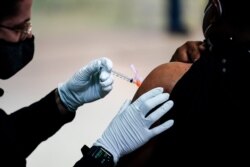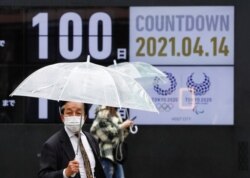An independent panel of U.S. health experts is delaying a final decision about Johnson & Johnson’s COVID-19 vaccine as they get more information about it and possible links to a very rare but dangerous blood clot.
The Centers for Disease Control and Prevention’s immunization advisory committee held an emergency meeting Wednesday, one day after the CDC and the Food and Drug Administration issued a joint statement recommending a pause in the use of the one-dose vaccine after six women between 18 and 48 years old developed blood clots known as cerebral venous sinus thrombosis (CVST) within six to 13 days after being inoculated. One of the women died, while another has been hospitalized in critical condition.
The six cases were among the more than 7 million people in the United States who have been inoculated with the Johnson & Johnson vaccine.
Dr. Beth Bell, a global health expert at the University of Washington, was one of the members who argued in favor of gaining more information. But Bell called the blood clotting incidents “a very rare event” and insisted she didn’t want to send a message “that there is something fundamentally wrong with this vaccine.”
Delays in Europe
But the reports prompted the U.S. pharmaceutical giant Tuesday to announce it was delaying rollout in Europe, where vaccination efforts have been plagued by a shortage of vaccines and logistical problems, as well as the troubled rollout of the AstraZeneca vaccine, which has also been linked to cases of rare blood clots.
Both the AstraZeneca and Johnson & Johnson vaccines were developed by using so-called adenoviruses to carry DNA into human cells that generates the body’s immune system to ward off the coronavirus.
The issues with the AstraZeneca and Johnson & Johnson vaccines led the European Union to announce Wednesday that 50 million doses of the Pfizer COVID-19 vaccine that it was initially slated to receive by the end of the year will be delivered by June, adding to the 200 million doses it was already expecting to receive by then.
In a related matter, Denmark became the first country in the world on Wednesday to permanently stop administering the AstraZeneca vaccine because of the suspected blood clots, just a month after health officials suspended use of the two-shot regimen.
Tokyo Olympic Games
The world is nearing 3 million deaths from COVID-19 out of 138.2 million confirmed total cases, according to Johns Hopkins Coronavirus Resource Center. Many nations are undergoing a new surge of the virus, which is throwing doubt and confusion over numerous planned events, including the upcoming Tokyo Olympic Games.
Toshihiro Nikai, the secretary-general of Japan’s ruling Liberal Democratic Party, said Thursday during a televised interview the Olympics should be cancelled if the current wave of new infections grows out of control. Nikai’s remarks came a day after Japan hit the milestone of 100 days before the July 23 official ceremony.
The Tokyo Olympics were scheduled for last July and August, but organizers and then-Prime Minister Shinzo Abe decided to postpone the event for a year as the novel coronavirus pandemic began spreading across the globe.
However, with Tokyo and other parts of Japan under a state of emergency to quell a surge of new infections, public opinion polls show an overwhelming majority of Japanese believe the games should be postponed again or canceled.








